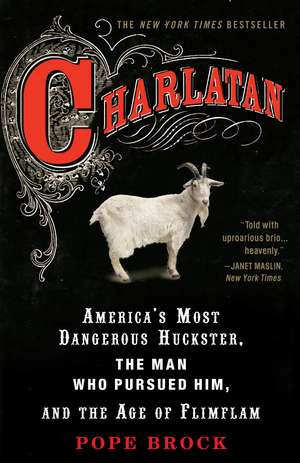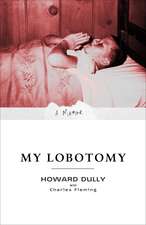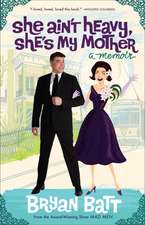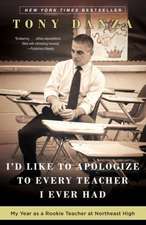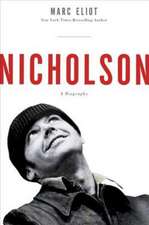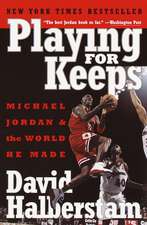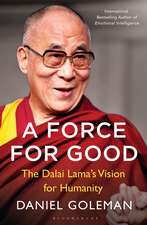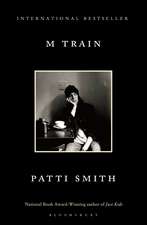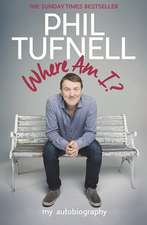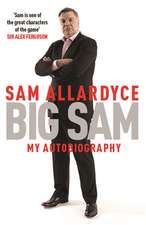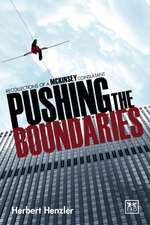Charlatan
Autor Pope Brocken Limba Engleză Paperback – 13 ian 2009
In 1917, John R. Brinkley–America’s most brazen con man–introduced an outlandish surgical method for restoring fading male virility.
It was all nonsense, but thousands of eager customers quickly made “Dr.” Brinkley one of America’s richest men–and a national celebrity. The great quack buster Morris Fishbein vowed to put the country’s “most daring and dangerous” charlatan out of business, yet each effort seemed only to spur Brinkley to new heights of ingenuity, and the worlds of advertising, broadcasting, and politics soon proved to be equally fertile grounds for his potent brand of flimflam.
Culminating in a decisive courtroom confrontation, Charlatan is a marvelous portrait of a boundlessly audacious rogue on the loose in an America ripe for the bamboozling.
Preț: 123.55 lei
Puncte Express: 185
Preț estimativ în valută:
21.85€ • 25.91$ • 19.02£
21.85€ • 25.91$ • 19.02£
Carte disponibilă
Livrare economică 09-23 martie
Specificații
ISBN-13: 9780307339898
ISBN-10: 0307339890
Pagini: 346
Ilustrații: 8-PAGE B&W INSERT
Dimensiuni: 132 x 203 x 19 mm
Greutate: 0.39 kg
Ediția:Reprint
Editura: Crown
ISBN-10: 0307339890
Pagini: 346
Ilustrații: 8-PAGE B&W INSERT
Dimensiuni: 132 x 203 x 19 mm
Greutate: 0.39 kg
Ediția:Reprint
Editura: Crown
Recenzii
“Told with uproarious brio…heavenly…A book so lively that its wild stories are virtually wall to wall.”
—Janet Maslin, New York Times
“An extraordinary saga of the most dangerous quack of all time…A talented storyteller, [Brock] digs deep into the personal secrets of his characters…entrancing.”
—USA Today
“You will devour Charlatan, Pope Brock’s tale of fools and fanatics. With a vast and wild cast of characters, and filled with issues and topics that resonate through the years Charlatan begs comparison with Erik Larson’s The Devil in the White City and deserves to be a best seller.”
—Chicago Tribune
“Written with glee, in a style that is pure gusto, a bubbling fountain of metaphor and arresting image…Fishbein's campaign against Brinkley makes up one strand of this extraordinary tale and provides it with a bravura courtroom finale.”
—Boston Globe
“Superbly crafted and enthralling...Brock’s droll style is perfect for this tale of trickery and credulity.”
—Financial Times
“Hugely amusing [but also] dark and cautionary, a reminder of the high price of gullibility and ignorance.”
—Jonathan Yardley, Washington Post Book World
“A compelling slice of lurid Americana…fun to read.”
—Entertainment Weekly
“Fascinating…Brock is gifted.”
—Associated Press
“Pope Brock reaches into the past and captures an incredible story…perceptive.”
—Chicago Sun-Times
“An irresistible and wide-ranging slice of popular history.”
—The Seattle Times
“If Hollywood hasn't already optioned [this], what's keeping it?
—David Gates, Newsweek
“Wonderful…a gripping narrative”
—Nature
“A rollicking biography–at turns funny and horrifying, brimming with wit, insight and who-knew facts.”
—Wichita Eagle
“Wonderful American social history and lots of fun.”
—Kirkus Reviews
“In this lively and absorbing biography, Brock deftly captures the consummate snake-oil salesman and gifted entrepreneur John R. Brinkley…recommended.”
—Library Journal
“Brinkley’s astonishing rise and fall story is told with wry good humor in Charlatan…compelling.”
—The Times (Acadiana, Louisiana)
"Brock exploits the outlandishness of Brinkley’s escapades to brilliant comic effect."
—Washington CEO
“This spellbinding saga of a once-famous medical man who left all too many corpses in his wake is nothing short of spectacular. Impeccably researched, smartly crafted, beautifully written, it’s a pure joy to read. And dealing, as it does, with eternal traits of human greed and gullibility, this extraordinary book is timely as well as timeless…A mesmerizing must-read, written by a writer of exquisite talent…One is left with the kind of reaction one has after reading a masterpiece.”
—Heinz Kohler, Willard Long Thorp Professor of Economics, Emeritus Amherst College
“Take the Duke and the King in Adventures of Huckleberry Finn. Roll them into one. Hand this creature a scalpel, a radio microphone and the sweet-talking skills to get filthy rich hawking a deadly implantation of goat sexual organs to gullible American men– and women. Then set him about transforming American pop culture in the 1920s and 30s. You have John R. Brinkley, a con artist of leviathan proportions. Pope Brock's true-life account of this comic-evil monster is nothing less than Twainian: a blend of reportage, social history, portraiture and storytelling in the gland--excuse me, in the grand tradition."
—Ron Powers, author of Mark Twain: A Life
“Come one, come all, to the fabulous, hilarious world of rheostatic dynamizers, foot-powered breast enlargers, and goat-gland transplants--the surreal province of one John Brinkley, diploma-mill quack and flimflammer extraordinaire. With perfect pitch story-telling and wonderfully stylish prose, Pope Brock gives us a portrait of a master fraud as Brinkley works the ballyhou-stoked pseudo-science of the Twenties and Thirties to take in millions, while dodging ex-patients, the law, and the AMA. A dazzling cast of walk-ons includes Sinclair Lewis, Eugene V. Debs, a hypochondriacal H. L Mencken, Mussolini, and Sigmund Freud, not to mention Nora, the Monkey Turned Woman. Stranger than fiction doesn't really say it. This is a book you won't put down and a story you'll never forget.”
—James R. Gaines, author of For Liberty and Glory: Washington, LaFayette and Their Revolutions
“Shocking and hilarious in equal measure, this is an extraordinary story of greed, gullibility and goat-glands. In chronicling the outrageous career of John R. Brinkley, king of the quack doctors, Pope Brock has also written a cautionary tale for our own times – about celebrity, mass-marketing, media power, political huckstering and the dangerous allure of mumbo-jumbo. As irresistible as Brinkley’s snake-oil, and far more invigorating, Charlatan is an instant classic.”
—Francis Wheen, author of How Mumbo-Jumbo Conquered the World and The Irresistable Con: The Bizarre Life of a Fraudulent Genius
“Astonishing…This masterfully told story of the world’s most dangerous quack and the medical sleuth who tracked him down is a delight. Brock skilfully mines the narrow fissure between cutting-edge medicine and outrageous quackery while plumbing the depths of human credulity. His punchy, exuberant style is spot-on perfect for this improbable tale of money, murder and menace.”
—Wendy Moore, author of The Knife Man: Blood, Body-Snatching and the Birth of Modern Surgery
"Before ‘The Mythbusters’ put truth to the test on national television (usually by blowing things up), and before the Amazing Randi went on the Tonight Show with Johnny Carson to expose charlatans and frauds in front of millions, there was Morris Fishbein, a quackbuster extraordinaire who relentlessly pursued the greatest charlatan of the 1920s and 1930s, one Dr. John Brinkley, huckster of quack cures and remedies, commercial hustler and schemer, and in the end a cold-hearted murderer. Pope Brock's gripping tale of fraud and flimflam is at once compelling and disturbing--compelling because it's such a great read, disturbing because it reveals the endless gullibility of human nature."
—Michael Shermer, Publisher of Skeptic magazine, monthly columnist for Scientific American, author of Why People Believe Weird Things, How We Believe, and Why Darwin Matters
“Charlatan is the fabulous tale of John R. Brinkley, notorious purveyor of goat-gland flimflam, and unsung pioneer who changed the face of American politics, mass media, popular taste, and–yes--medicine.”
—Joel Best, author of Flavor of the Month: Why Smart People Fall for Fads
"Charlatan is a serious work of history that reads like a novel. It tells the story of the little-known Dr. John Brinkley and his unquenchable thirst for fame and fortune. Along the way, however, it paints a refreshingly unique and vivid portrait of America as it struggled to maintain its Jacksonian faith in democracy at the same time that it looked to the magic of scientific experts to find new cures to old problems. Rarely has history been this fun, fast-paced, or fulfilling."
—Steven M. Gillon, author of Ten Days That Unexpectedly Changed America
“A fascinating look at one of America's most dangerous quacks and the advertising and political maneuvering that sustained him. Must reading for everyone who wants to understand the dark side of the marketplace and the vulnerability of its victims.”
—Stephen Barrett, M.D., Head, Quackwatch.org, author of The Health Robbers
From the Hardcover edition.
—Janet Maslin, New York Times
“An extraordinary saga of the most dangerous quack of all time…A talented storyteller, [Brock] digs deep into the personal secrets of his characters…entrancing.”
—USA Today
“You will devour Charlatan, Pope Brock’s tale of fools and fanatics. With a vast and wild cast of characters, and filled with issues and topics that resonate through the years Charlatan begs comparison with Erik Larson’s The Devil in the White City and deserves to be a best seller.”
—Chicago Tribune
“Written with glee, in a style that is pure gusto, a bubbling fountain of metaphor and arresting image…Fishbein's campaign against Brinkley makes up one strand of this extraordinary tale and provides it with a bravura courtroom finale.”
—Boston Globe
“Superbly crafted and enthralling...Brock’s droll style is perfect for this tale of trickery and credulity.”
—Financial Times
“Hugely amusing [but also] dark and cautionary, a reminder of the high price of gullibility and ignorance.”
—Jonathan Yardley, Washington Post Book World
“A compelling slice of lurid Americana…fun to read.”
—Entertainment Weekly
“Fascinating…Brock is gifted.”
—Associated Press
“Pope Brock reaches into the past and captures an incredible story…perceptive.”
—Chicago Sun-Times
“An irresistible and wide-ranging slice of popular history.”
—The Seattle Times
“If Hollywood hasn't already optioned [this], what's keeping it?
—David Gates, Newsweek
“Wonderful…a gripping narrative”
—Nature
“A rollicking biography–at turns funny and horrifying, brimming with wit, insight and who-knew facts.”
—Wichita Eagle
“Wonderful American social history and lots of fun.”
—Kirkus Reviews
“In this lively and absorbing biography, Brock deftly captures the consummate snake-oil salesman and gifted entrepreneur John R. Brinkley…recommended.”
—Library Journal
“Brinkley’s astonishing rise and fall story is told with wry good humor in Charlatan…compelling.”
—The Times (Acadiana, Louisiana)
"Brock exploits the outlandishness of Brinkley’s escapades to brilliant comic effect."
—Washington CEO
“This spellbinding saga of a once-famous medical man who left all too many corpses in his wake is nothing short of spectacular. Impeccably researched, smartly crafted, beautifully written, it’s a pure joy to read. And dealing, as it does, with eternal traits of human greed and gullibility, this extraordinary book is timely as well as timeless…A mesmerizing must-read, written by a writer of exquisite talent…One is left with the kind of reaction one has after reading a masterpiece.”
—Heinz Kohler, Willard Long Thorp Professor of Economics, Emeritus Amherst College
“Take the Duke and the King in Adventures of Huckleberry Finn. Roll them into one. Hand this creature a scalpel, a radio microphone and the sweet-talking skills to get filthy rich hawking a deadly implantation of goat sexual organs to gullible American men– and women. Then set him about transforming American pop culture in the 1920s and 30s. You have John R. Brinkley, a con artist of leviathan proportions. Pope Brock's true-life account of this comic-evil monster is nothing less than Twainian: a blend of reportage, social history, portraiture and storytelling in the gland--excuse me, in the grand tradition."
—Ron Powers, author of Mark Twain: A Life
“Come one, come all, to the fabulous, hilarious world of rheostatic dynamizers, foot-powered breast enlargers, and goat-gland transplants--the surreal province of one John Brinkley, diploma-mill quack and flimflammer extraordinaire. With perfect pitch story-telling and wonderfully stylish prose, Pope Brock gives us a portrait of a master fraud as Brinkley works the ballyhou-stoked pseudo-science of the Twenties and Thirties to take in millions, while dodging ex-patients, the law, and the AMA. A dazzling cast of walk-ons includes Sinclair Lewis, Eugene V. Debs, a hypochondriacal H. L Mencken, Mussolini, and Sigmund Freud, not to mention Nora, the Monkey Turned Woman. Stranger than fiction doesn't really say it. This is a book you won't put down and a story you'll never forget.”
—James R. Gaines, author of For Liberty and Glory: Washington, LaFayette and Their Revolutions
“Shocking and hilarious in equal measure, this is an extraordinary story of greed, gullibility and goat-glands. In chronicling the outrageous career of John R. Brinkley, king of the quack doctors, Pope Brock has also written a cautionary tale for our own times – about celebrity, mass-marketing, media power, political huckstering and the dangerous allure of mumbo-jumbo. As irresistible as Brinkley’s snake-oil, and far more invigorating, Charlatan is an instant classic.”
—Francis Wheen, author of How Mumbo-Jumbo Conquered the World and The Irresistable Con: The Bizarre Life of a Fraudulent Genius
“Astonishing…This masterfully told story of the world’s most dangerous quack and the medical sleuth who tracked him down is a delight. Brock skilfully mines the narrow fissure between cutting-edge medicine and outrageous quackery while plumbing the depths of human credulity. His punchy, exuberant style is spot-on perfect for this improbable tale of money, murder and menace.”
—Wendy Moore, author of The Knife Man: Blood, Body-Snatching and the Birth of Modern Surgery
"Before ‘The Mythbusters’ put truth to the test on national television (usually by blowing things up), and before the Amazing Randi went on the Tonight Show with Johnny Carson to expose charlatans and frauds in front of millions, there was Morris Fishbein, a quackbuster extraordinaire who relentlessly pursued the greatest charlatan of the 1920s and 1930s, one Dr. John Brinkley, huckster of quack cures and remedies, commercial hustler and schemer, and in the end a cold-hearted murderer. Pope Brock's gripping tale of fraud and flimflam is at once compelling and disturbing--compelling because it's such a great read, disturbing because it reveals the endless gullibility of human nature."
—Michael Shermer, Publisher of Skeptic magazine, monthly columnist for Scientific American, author of Why People Believe Weird Things, How We Believe, and Why Darwin Matters
“Charlatan is the fabulous tale of John R. Brinkley, notorious purveyor of goat-gland flimflam, and unsung pioneer who changed the face of American politics, mass media, popular taste, and–yes--medicine.”
—Joel Best, author of Flavor of the Month: Why Smart People Fall for Fads
"Charlatan is a serious work of history that reads like a novel. It tells the story of the little-known Dr. John Brinkley and his unquenchable thirst for fame and fortune. Along the way, however, it paints a refreshingly unique and vivid portrait of America as it struggled to maintain its Jacksonian faith in democracy at the same time that it looked to the magic of scientific experts to find new cures to old problems. Rarely has history been this fun, fast-paced, or fulfilling."
—Steven M. Gillon, author of Ten Days That Unexpectedly Changed America
“A fascinating look at one of America's most dangerous quacks and the advertising and political maneuvering that sustained him. Must reading for everyone who wants to understand the dark side of the marketplace and the vulnerability of its victims.”
—Stephen Barrett, M.D., Head, Quackwatch.org, author of The Health Robbers
From the Hardcover edition.
Notă biografică
POPE BROCK is the author of the critically acclaimed Indiana Gothic, the story of his great-grandfather’s murder in 1908. Brock has written for numerous publications, including Rolling Stone, Esquire, GQ, and the London Sunday Times Magazine. He lives in upstate New York with his twin daughters, Molly and Hannah.
From the Hardcover edition.
From the Hardcover edition.
Extras
1
In the period before the First World War, the Reinhardt brothers, Willis and Wallace, owned a thriving chain of anatomical museums: the London Medical Institute, the Paris Medical Institute, the Heidelberg, the Copenhagen, and so forth. Located in Des Moines, Fort Wayne, East St. Louis, and other towns throughout the Midwest, they were devoted to the documentation and cure of "men's secret diseases." Most had big display windows facing the street, and what the Reinhardts put in those windows was the talk of the industry. Their most celebrated exhibit, in Minneapolis, was entitled "The Dying Custer."
He lay like Saint Sebastian, bristling with arrows, in a lavish three-dimensional tableau. Redskins, corpses, and plaster vultures added richness to the scene, but what kept passersby bunched at the window, staring in for minutes on end, was the slow, rhythmic heaving of Custer's chest. They gazed till their own breathing fell into sync--it was irresistible--and that gave the Reinhardts' message time to go to work. True, Custer's connection to impotence may have been largely metaphorical, but to a certain fretful portion of the populace it struck home. Power gone, youth destroyed--but not yet, not quite yet. Inside this building there was even hope for Yellow Hair.
Mixing terror and hope was the Reinhardts' stock-in-trade. Their window in Gary, Indiana--again designed by their visionary house artist, Monsieur Brouillard--featured a diorama of a doctor and nurse trying to save a syphilitic baby with the help of a wheezing resuscitator. But displays alone, no matter how artful, didn't make the Reinhardt twins tops in their field. From their headquarters at the Vienna Medical Institute in Chicago, where they rode herd on some three dozen franchises, they enforced levels of standardization and quality control remarkably ahead of their time. Starting with their training of salesmen: nobody worked for the Reinhardts without first graduating from the "instantaneous medical college" at the home office. This was followed by more training at the Gary branch, where each recruit was given a white coat, asked to grow a Vandyke, and made to practice his patter as if it were Gilbert and Sullivan. Only then were real customers released upon them. Serving as exhibition guides, the floor men were expected to nail twenty percent of all prospects--eight out of an average forty walk-ins a day--or look for another job. The manager of each institute sent headquarters a daily financial report in triplicate.
Admission was free at all these places. The abba-dabba juice was not. Bottles of it were on sale at the exit, a fabled elixir guaranteed to soothe, stimulate, inflate, reinstate, backdate, laminate, and in general make "the withered bough quicken and grow green again," while at the same time curing and/or preventing the clap; it adapted to the needs of the customer. What was in it? What was in any of them? What was in Dr. Raphael's Cordial Invigorant, America's first big virility tonic in the 1850s, whose royal Arabian formula was made vastly more potent by the "magical influence of modern Astrologers"? What was the recipe for Baume de Vie, Elixir Renovans, the Syrop Vitae of Anthony Bellou, the Glorious Spagyric of Jone Case, or any of the others in lands and ages stretching back to the dawn of time? For the record, the Reinhardts' tonic contained three ingredients--alcohol, sugar, and a dash of "Aqua Missourianas quantitat sufficiat ad cong II"--but this is pedantry.
Big as they were, the Reinhardts still had plenty of competition. Independents with similar rackets were out there grubbing in the twilight, men like Dr. Burke of Knoxville, Tennessee, who in 1907 was running his own small shop with the help of an assistant, Dr. John Brinkley.
Young Brinkley was a likely lad of twenty-two. To call him a doctor was, in the strictest sense, inaccurate, but if the white coat reassured people, the healing had begun. In truth he was the floor man and he worked on commission. Brinkley would study a prospect as he came through the door, then materialize--not too soon--at his elbow. The young physician chatted, he chuckled, he took a grave interest; he showed the man around. Soon the two were passing along the main line of exhibits: a stage-by-stage depiction of the male member in syphilitic decline. It spoke for itself. With each new cabinet the organ grew more deformed and the colors changed. Perhaps leprosy was mentioned by way of comparison.
In the last room the customer met The Boy.
It was known by that name throughout the trade, and every "free educational anatomical institute" worth its salt had one. The scene was replayed countless times: while the salesman hung back, or bent to tie his shoe, the customer approached a rectangular pillar walled in glass. It was pitch-dark inside. The mark moved toward it cautiously, perhaps glancing back at his guide for the go-ahead, peered in close trying to see what was in there--and then the lights blazed on full, and the grinning wax face of an idiot sprang into view. Horrifying as it was, the warning above it was even worse:
LOST MANHOOD
The customer knew then that he wasn't just looking at a vile mask with dripping yellow eyes. He was looking at the future. He was looking at himself.
After this bit of venereal kabuki--"the convincer," in quack talk--the rest was usually easy. As Dr. Burke sat at a desk, possibly lost in a medical tome, Dr. Brinkley brought the poor sinner forward and introduced him. Burke gave him an "instant consultation" ("Are you ever thirsty?" "Do you sometimes suffer from fatigue?"--warning signs all) and produced a bottle of peerless tonic, which the man was assured would save his organ and probably his life. The price was almost as big a shock as The Boy, between ten and twenty dollars, but who in his right mind would economize at a time like this? Moments later the customer was standing in the alley with the hooey in his hand and the door shut firmly behind him.
How much satisfaction Brinkley felt at such moments is unknown. The greatest quacks never gloat for long; when deception is the drug, there's no building up a supply. Besides, he had so much ambition that working in two tatty rooms with a substandard Boy could have been depressing at times.
On the other hand, he might have taken pride in having gotten so far so young. Brinkley came from the tiny town of Beta, North Carolina, tucked in the Great Smokies not far from the Tennessee line. Like his neighbors, he grew up on a hilly little farm that produced mostly rocks. He ate mush and greens and lashed gunnysacks to his feet for winter boots. The thick forests and hard climbs, the rainy days when bowls of fog gathered in the valleys, the strangers scarce as hen's teeth: all this conspired to make the outside world seem little more than a rumor, so it was natural that most people, if they started out there, stayed put.
Not Brinkley. "Kind of a recklesslike boy," one neighbor called him. "Lively as a cricket," another said. And all the while he burned with a bitter fire, and he dreamed. ("I thought of John Brinkley freeing the slaves," he said later, "John Brinkley illuminating the world, John Brinkley facing an assassin's bullet for the sake of his people, John Brinkley healing the sick.") But with the slaves freed, the world lit, and nobody caring enough about him to kill him, he chose number four--sort of. First he married Sally Wike, a spitfire from a neighboring farm, as eager as he was to escape the prison of the mountains. Then "he got up a little play," as Mrs. Ann Bennett, who boarded them briefly, recalled it, "and he and his wife and some more people went on the road from town to town, you know, giving little plays."
He sang and he danced and he healed. Barely twenty, Brinkley got his precocious start touring as a type of medicine man known as a Quaker doctor. Though, in the general run of Quakers, specialty numbers were almost unknown, some itinerant quacks in those days liked to impersonate them, trading on their legendary rectitude. Some folks saw through the act, but it hardly mattered. Fooling some of the people all of the time and all of the people some of the time was plenty.
They usually performed at night. A platform was unfolded and torches placed at each corner as the audience gathered, drawn by handbills and word of mouth. While there is no specific record of a Brinkley performance, there was a set pattern to most Quaker-doctor shows. First a fiddler or a dancer got the crowd warmed up. A short morality play followed, in which a noble head of house or ringleted female died pathetically for lack of a miracle tonic, identified by name. Finally the physician himself (Brinkley) shot onstage in a dinner-plate hat, cutaway coat, and pious pants that buttoned up the sides, theeing and thouing, singing and selling, waving a bottle of Ayer's Cathartic Pills. Or maybe Burdock Blood Bitters or Aunt Fanny's Worm Candy. One thing was for sure, whatever it was cured whatever you had.
With his unerring nose for where the money was, Brinkley had already become an American archetype: the quack on the boards. For in our nation with its special genius for swindle--where swampland, beefsteak mines, and tickets to nonexistent attractions practically sell themselves--medical fraud had always been the king of cons. At the 1893 World's Fair in Chicago, a man dressed as a cowboy appeared onstage and strangled rattlesnakes by the dozen. He called what came out of them snake oil. People bought it.
Of course quacks have flourished in all ages and cultures, for nothing shows reason the door like cures for things. Unlike most scams, which target greed, quackery fires deeper into Jungian universals: our fear of death, our craving for miracles. When we see night approaching, nearly all of us are rubes.
Still, there has probably never been a more quack-prone and quack-infested country than the United States. Flocking west with the pioneers, they struck in one town, vanished to the next, and taught their tricks to others. Dupes were as common as passenger pigeons. Many Americans viewed hospitals, sometimes with justice, as tricked-up funeral homes and doctors as crooks who had a financial stake in keeping them sick.
But quacks weren't just accepted; they were joyously embraced, thanks to a perverse seam in the American mind stretching back almost to the dawn of the republic.
It first appeared in the early nineteenth century. In the heady days of Jacksonian democracy, that delirious celebration of the ordinary, the nation's elite--preachers, doctors, lawyers--were overthrown (at least mentally) with an abandon reminiscent of the French Revolution. Suddenly, to be educated was to be despised. Now, when it came to physicians, Americans not only tolerated but demanded incompetence. So high was the common man exalted that state governments, all but three, actually repealed licensing requirements for doctors. In midcentury educator Lemuel Shattuck, asked by the Massachusetts legislature to conduct a sanitary survey of that state, reported back: "Any one, male or female, learned or ignorant, an honest man or a knave, can assume the name of physician, and 'practice' upon any one, to cure or to kill, as either may happen, without accountability. It's a free country!"
The result of all this deregulation was the quack equivalent of the Oklahoma Land Rush, with effects that lasted for generations to come. Legitimate doctors had difficulty fighting back, their own record being spotty at best. Take Dr. Benjamin Rush, friend to the founders, signer of the Declaration of Independence, and by common consent the father of American medicine, who for many years after his death remained the nation's best-known physician. Hardworking, honest, a man who took his role as medical counselor to the nation seriously, he was also a virtual death machine, as grossly misguided as he was sincere. Rush favored bombing the body with mercury-laced calomel (which caused rampant diarrhea, bleeding of the gums, and uncontrolled drooling), blistering with hot irons (pain to no purpose), tobacco-smoke enemas, and bleeding by the pint. Some remember him today as the man who murdered George Washington, albeit unintentionally. Of course every evil has its upside: thanks in part to men like Rush, degenerative diseases of the heart, liver, kidneys, and so forth were almost unknown because so few people lived long enough to contract them.
So just who were the quacks? In this melee of plagues and poisons did it even matter? Granted, the people who bought pills against earthquakes were probably wasting their money, but when a man like Elisha Perkins (a contemporary of Dr. Rush) came along with his "galvanic tractors," fussing over the body with some hocus-pocus and two metal rods, at least he held with Hippocrates and did no harm. Like Dr. Rush, Dr. Perkins believed in what he was doing. Both were wrong, yet the one was honored and the other condemned. Given history like this, it becomes easier to understand why the people John Brinkley played to--especially the sick and frightened--were willing to give that youngster onstage the benefit of the doubt.
Confederates passed through the crowd laden with bottles of medicine for sale, while he cried up its vitalizing force, efficacious effluvium, and low, low price.
"All sold out, Doctor!"
"Bless you, my friends!"
The little troupe disbanded within a few months, and Brinkley never sang or danced for the rest of his career. Though he learned some important lessons, which he would later apply on the world stage, he was a faux scientist of the twentieth century, not a clown of the nineteenth. Working for Dr. Burke, his next step, at least put him in the right coat. But like his early role model, Abraham Lincoln, his ambition was a little engine that knew no rest, and in 1908 Brinkley moved on again, heading north this time toward the big city.
2
One thing at least would have been familiar: the fog that dragged, Smoky Mountain-style, across the grain elevators along the Chicago River. Some days it swallowed up portions of the city. It settled in doorways and ballooned slowly from passageways and alleys, mixing with steam and coal smoke, through which pedestrians burst as if out of a dream.
The city threw light at the problem. Along with snake oil, its recent world's fair had showcased Edison's great breakthrough, and ever since then Chicago had been his best customer. It became a city, one resident said, of "incredibly long lanes of street-lamps, up and down the slopes; light everywhere; light lavished and wasted; as much candle-power used in a week as the whole nation once used in a year." And it was by this light, on an evening's prowl along the Gold Coast, that Brinkley first beheld the world he had always dreamed of.
From the Hardcover edition.
In the period before the First World War, the Reinhardt brothers, Willis and Wallace, owned a thriving chain of anatomical museums: the London Medical Institute, the Paris Medical Institute, the Heidelberg, the Copenhagen, and so forth. Located in Des Moines, Fort Wayne, East St. Louis, and other towns throughout the Midwest, they were devoted to the documentation and cure of "men's secret diseases." Most had big display windows facing the street, and what the Reinhardts put in those windows was the talk of the industry. Their most celebrated exhibit, in Minneapolis, was entitled "The Dying Custer."
He lay like Saint Sebastian, bristling with arrows, in a lavish three-dimensional tableau. Redskins, corpses, and plaster vultures added richness to the scene, but what kept passersby bunched at the window, staring in for minutes on end, was the slow, rhythmic heaving of Custer's chest. They gazed till their own breathing fell into sync--it was irresistible--and that gave the Reinhardts' message time to go to work. True, Custer's connection to impotence may have been largely metaphorical, but to a certain fretful portion of the populace it struck home. Power gone, youth destroyed--but not yet, not quite yet. Inside this building there was even hope for Yellow Hair.
Mixing terror and hope was the Reinhardts' stock-in-trade. Their window in Gary, Indiana--again designed by their visionary house artist, Monsieur Brouillard--featured a diorama of a doctor and nurse trying to save a syphilitic baby with the help of a wheezing resuscitator. But displays alone, no matter how artful, didn't make the Reinhardt twins tops in their field. From their headquarters at the Vienna Medical Institute in Chicago, where they rode herd on some three dozen franchises, they enforced levels of standardization and quality control remarkably ahead of their time. Starting with their training of salesmen: nobody worked for the Reinhardts without first graduating from the "instantaneous medical college" at the home office. This was followed by more training at the Gary branch, where each recruit was given a white coat, asked to grow a Vandyke, and made to practice his patter as if it were Gilbert and Sullivan. Only then were real customers released upon them. Serving as exhibition guides, the floor men were expected to nail twenty percent of all prospects--eight out of an average forty walk-ins a day--or look for another job. The manager of each institute sent headquarters a daily financial report in triplicate.
Admission was free at all these places. The abba-dabba juice was not. Bottles of it were on sale at the exit, a fabled elixir guaranteed to soothe, stimulate, inflate, reinstate, backdate, laminate, and in general make "the withered bough quicken and grow green again," while at the same time curing and/or preventing the clap; it adapted to the needs of the customer. What was in it? What was in any of them? What was in Dr. Raphael's Cordial Invigorant, America's first big virility tonic in the 1850s, whose royal Arabian formula was made vastly more potent by the "magical influence of modern Astrologers"? What was the recipe for Baume de Vie, Elixir Renovans, the Syrop Vitae of Anthony Bellou, the Glorious Spagyric of Jone Case, or any of the others in lands and ages stretching back to the dawn of time? For the record, the Reinhardts' tonic contained three ingredients--alcohol, sugar, and a dash of "Aqua Missourianas quantitat sufficiat ad cong II"--but this is pedantry.
Big as they were, the Reinhardts still had plenty of competition. Independents with similar rackets were out there grubbing in the twilight, men like Dr. Burke of Knoxville, Tennessee, who in 1907 was running his own small shop with the help of an assistant, Dr. John Brinkley.
Young Brinkley was a likely lad of twenty-two. To call him a doctor was, in the strictest sense, inaccurate, but if the white coat reassured people, the healing had begun. In truth he was the floor man and he worked on commission. Brinkley would study a prospect as he came through the door, then materialize--not too soon--at his elbow. The young physician chatted, he chuckled, he took a grave interest; he showed the man around. Soon the two were passing along the main line of exhibits: a stage-by-stage depiction of the male member in syphilitic decline. It spoke for itself. With each new cabinet the organ grew more deformed and the colors changed. Perhaps leprosy was mentioned by way of comparison.
In the last room the customer met The Boy.
It was known by that name throughout the trade, and every "free educational anatomical institute" worth its salt had one. The scene was replayed countless times: while the salesman hung back, or bent to tie his shoe, the customer approached a rectangular pillar walled in glass. It was pitch-dark inside. The mark moved toward it cautiously, perhaps glancing back at his guide for the go-ahead, peered in close trying to see what was in there--and then the lights blazed on full, and the grinning wax face of an idiot sprang into view. Horrifying as it was, the warning above it was even worse:
LOST MANHOOD
The customer knew then that he wasn't just looking at a vile mask with dripping yellow eyes. He was looking at the future. He was looking at himself.
After this bit of venereal kabuki--"the convincer," in quack talk--the rest was usually easy. As Dr. Burke sat at a desk, possibly lost in a medical tome, Dr. Brinkley brought the poor sinner forward and introduced him. Burke gave him an "instant consultation" ("Are you ever thirsty?" "Do you sometimes suffer from fatigue?"--warning signs all) and produced a bottle of peerless tonic, which the man was assured would save his organ and probably his life. The price was almost as big a shock as The Boy, between ten and twenty dollars, but who in his right mind would economize at a time like this? Moments later the customer was standing in the alley with the hooey in his hand and the door shut firmly behind him.
How much satisfaction Brinkley felt at such moments is unknown. The greatest quacks never gloat for long; when deception is the drug, there's no building up a supply. Besides, he had so much ambition that working in two tatty rooms with a substandard Boy could have been depressing at times.
On the other hand, he might have taken pride in having gotten so far so young. Brinkley came from the tiny town of Beta, North Carolina, tucked in the Great Smokies not far from the Tennessee line. Like his neighbors, he grew up on a hilly little farm that produced mostly rocks. He ate mush and greens and lashed gunnysacks to his feet for winter boots. The thick forests and hard climbs, the rainy days when bowls of fog gathered in the valleys, the strangers scarce as hen's teeth: all this conspired to make the outside world seem little more than a rumor, so it was natural that most people, if they started out there, stayed put.
Not Brinkley. "Kind of a recklesslike boy," one neighbor called him. "Lively as a cricket," another said. And all the while he burned with a bitter fire, and he dreamed. ("I thought of John Brinkley freeing the slaves," he said later, "John Brinkley illuminating the world, John Brinkley facing an assassin's bullet for the sake of his people, John Brinkley healing the sick.") But with the slaves freed, the world lit, and nobody caring enough about him to kill him, he chose number four--sort of. First he married Sally Wike, a spitfire from a neighboring farm, as eager as he was to escape the prison of the mountains. Then "he got up a little play," as Mrs. Ann Bennett, who boarded them briefly, recalled it, "and he and his wife and some more people went on the road from town to town, you know, giving little plays."
He sang and he danced and he healed. Barely twenty, Brinkley got his precocious start touring as a type of medicine man known as a Quaker doctor. Though, in the general run of Quakers, specialty numbers were almost unknown, some itinerant quacks in those days liked to impersonate them, trading on their legendary rectitude. Some folks saw through the act, but it hardly mattered. Fooling some of the people all of the time and all of the people some of the time was plenty.
They usually performed at night. A platform was unfolded and torches placed at each corner as the audience gathered, drawn by handbills and word of mouth. While there is no specific record of a Brinkley performance, there was a set pattern to most Quaker-doctor shows. First a fiddler or a dancer got the crowd warmed up. A short morality play followed, in which a noble head of house or ringleted female died pathetically for lack of a miracle tonic, identified by name. Finally the physician himself (Brinkley) shot onstage in a dinner-plate hat, cutaway coat, and pious pants that buttoned up the sides, theeing and thouing, singing and selling, waving a bottle of Ayer's Cathartic Pills. Or maybe Burdock Blood Bitters or Aunt Fanny's Worm Candy. One thing was for sure, whatever it was cured whatever you had.
With his unerring nose for where the money was, Brinkley had already become an American archetype: the quack on the boards. For in our nation with its special genius for swindle--where swampland, beefsteak mines, and tickets to nonexistent attractions practically sell themselves--medical fraud had always been the king of cons. At the 1893 World's Fair in Chicago, a man dressed as a cowboy appeared onstage and strangled rattlesnakes by the dozen. He called what came out of them snake oil. People bought it.
Of course quacks have flourished in all ages and cultures, for nothing shows reason the door like cures for things. Unlike most scams, which target greed, quackery fires deeper into Jungian universals: our fear of death, our craving for miracles. When we see night approaching, nearly all of us are rubes.
Still, there has probably never been a more quack-prone and quack-infested country than the United States. Flocking west with the pioneers, they struck in one town, vanished to the next, and taught their tricks to others. Dupes were as common as passenger pigeons. Many Americans viewed hospitals, sometimes with justice, as tricked-up funeral homes and doctors as crooks who had a financial stake in keeping them sick.
But quacks weren't just accepted; they were joyously embraced, thanks to a perverse seam in the American mind stretching back almost to the dawn of the republic.
It first appeared in the early nineteenth century. In the heady days of Jacksonian democracy, that delirious celebration of the ordinary, the nation's elite--preachers, doctors, lawyers--were overthrown (at least mentally) with an abandon reminiscent of the French Revolution. Suddenly, to be educated was to be despised. Now, when it came to physicians, Americans not only tolerated but demanded incompetence. So high was the common man exalted that state governments, all but three, actually repealed licensing requirements for doctors. In midcentury educator Lemuel Shattuck, asked by the Massachusetts legislature to conduct a sanitary survey of that state, reported back: "Any one, male or female, learned or ignorant, an honest man or a knave, can assume the name of physician, and 'practice' upon any one, to cure or to kill, as either may happen, without accountability. It's a free country!"
The result of all this deregulation was the quack equivalent of the Oklahoma Land Rush, with effects that lasted for generations to come. Legitimate doctors had difficulty fighting back, their own record being spotty at best. Take Dr. Benjamin Rush, friend to the founders, signer of the Declaration of Independence, and by common consent the father of American medicine, who for many years after his death remained the nation's best-known physician. Hardworking, honest, a man who took his role as medical counselor to the nation seriously, he was also a virtual death machine, as grossly misguided as he was sincere. Rush favored bombing the body with mercury-laced calomel (which caused rampant diarrhea, bleeding of the gums, and uncontrolled drooling), blistering with hot irons (pain to no purpose), tobacco-smoke enemas, and bleeding by the pint. Some remember him today as the man who murdered George Washington, albeit unintentionally. Of course every evil has its upside: thanks in part to men like Rush, degenerative diseases of the heart, liver, kidneys, and so forth were almost unknown because so few people lived long enough to contract them.
So just who were the quacks? In this melee of plagues and poisons did it even matter? Granted, the people who bought pills against earthquakes were probably wasting their money, but when a man like Elisha Perkins (a contemporary of Dr. Rush) came along with his "galvanic tractors," fussing over the body with some hocus-pocus and two metal rods, at least he held with Hippocrates and did no harm. Like Dr. Rush, Dr. Perkins believed in what he was doing. Both were wrong, yet the one was honored and the other condemned. Given history like this, it becomes easier to understand why the people John Brinkley played to--especially the sick and frightened--were willing to give that youngster onstage the benefit of the doubt.
Confederates passed through the crowd laden with bottles of medicine for sale, while he cried up its vitalizing force, efficacious effluvium, and low, low price.
"All sold out, Doctor!"
"Bless you, my friends!"
The little troupe disbanded within a few months, and Brinkley never sang or danced for the rest of his career. Though he learned some important lessons, which he would later apply on the world stage, he was a faux scientist of the twentieth century, not a clown of the nineteenth. Working for Dr. Burke, his next step, at least put him in the right coat. But like his early role model, Abraham Lincoln, his ambition was a little engine that knew no rest, and in 1908 Brinkley moved on again, heading north this time toward the big city.
2
One thing at least would have been familiar: the fog that dragged, Smoky Mountain-style, across the grain elevators along the Chicago River. Some days it swallowed up portions of the city. It settled in doorways and ballooned slowly from passageways and alleys, mixing with steam and coal smoke, through which pedestrians burst as if out of a dream.
The city threw light at the problem. Along with snake oil, its recent world's fair had showcased Edison's great breakthrough, and ever since then Chicago had been his best customer. It became a city, one resident said, of "incredibly long lanes of street-lamps, up and down the slopes; light everywhere; light lavished and wasted; as much candle-power used in a week as the whole nation once used in a year." And it was by this light, on an evening's prowl along the Gold Coast, that Brinkley first beheld the world he had always dreamed of.
From the Hardcover edition.
Descriere
In 1917, America's most brazen young con man arrived in the tiny town of Milford, Kansas. Quackbuster Morris Fishbein vowed to put the country's "most daring and dangerous" charlatan out of business. This work offers a marvelous portrait of an audacious rogue on the loose in an America that was ripe for the bamboozling.
